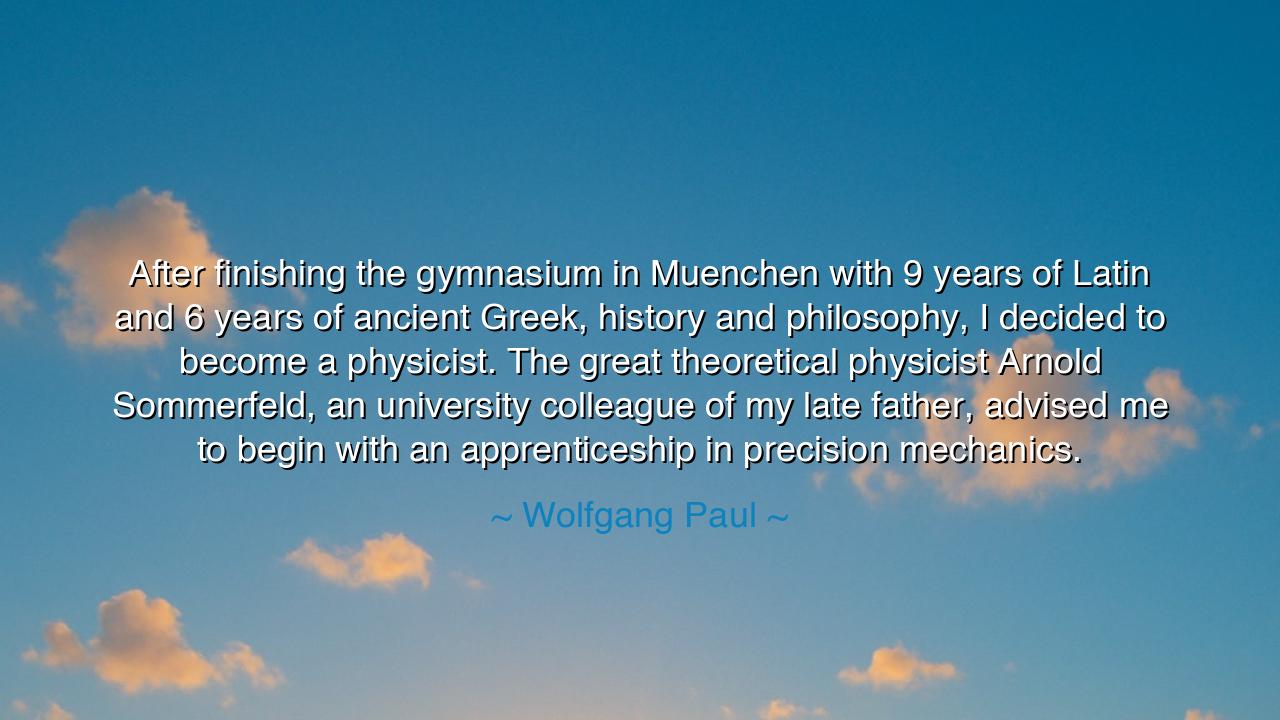
After finishing the gymnasium in Muenchen with 9 years of Latin
After finishing the gymnasium in Muenchen with 9 years of Latin and 6 years of ancient Greek, history and philosophy, I decided to become a physicist. The great theoretical physicist Arnold Sommerfeld, an university colleague of my late father, advised me to begin with an apprenticeship in precision mechanics.






The words of Wolfgang Paul, the great German physicist, are more than a recollection of youth—they are a parable of formation, a testament to the slow and sacred process by which the spirit is forged into mastery. “After finishing the gymnasium in Muenchen with 9 years of Latin and 6 years of ancient Greek, history and philosophy, I decided to become a physicist. The great theoretical physicist Arnold Sommerfeld... advised me to begin with an apprenticeship in precision mechanics.” In these words, one hears not merely a biography, but the echo of an older truth: wisdom precedes power, and discipline is the womb of creation. Before the lightning of discovery, there must be the long dawn of preparation.
In the ancient world, a young Greek would study not only arms but also logos, the word—the inner order of things. So too did Paul, though born in the modern age, walk a path the ancients would have recognized. He began with the languages of the dead, Latin and Greek, those vessels of thought that once carried Plato, Cicero, and Aristotle through the seas of the mind. For nine years and more, he trained not in the art of numbers, but in the grammar of reason—learning how the world is named, how thought itself is shaped. Thus he built the foundation not merely of a physicist, but of a philosopher of matter. It is as if he studied first the soul of the cosmos before touching its body.
Then came the counsel of Arnold Sommerfeld, a sage of science, whose wisdom bridged the realm of idea and craft. Sommerfeld, like a master in an ancient guild, did not send the youth directly to equations and abstractions. He urged him first to touch the instruments, to feel the grain of reality beneath his fingers. “Begin with an apprenticeship in precision mechanics,” he said—meaning: learn to shape the material before commanding it. For the mind that has never bent its knee to matter cannot hope to master it. In this, we hear the eternal truth of all craftsmanship: before one becomes a master, one must become a servant to the discipline.
Consider the life of Leonardo da Vinci, that immortal bridge between art and science. He, too, began as an apprentice in the workshop of Verrocchio, grinding pigments, carving wood, and measuring the proportions of the human form. Only through years of humble repetition did he earn the right to imagine machines that flew and bodies that breathed. Leonardo, like Wolfgang Paul, shows us that the imagination must be anchored in the hand, that the dreamer must first be a worker. The spirit of discovery is not born in abstraction; it arises from the marriage of idea and experience.
The meaning of Paul’s reflection, then, is not confined to physics or to one life. It speaks to all who would seek mastery in their calling. It reminds us that knowledge divorced from practice is a brittle thing, easily shattered by the first wind of reality. True understanding comes when intellect descends into the realm of the tangible, when the thinker learns to build, touch, measure, and endure. This is why the ancients revered not only philosophers but also artisans—the builders of temples and the carvers of marble—for they, too, grasped the order of the world through their hands.
And yet, there is also a humility in this story, a warning against arrogance. For in our age of rapid learning and instant information, many wish to leap directly into mastery without apprenticeship, to claim the summit without the climb. Paul’s words stand against this impatience. He reminds us that the roots of greatness lie buried deep in years of unseen labor, in disciplines that seem, at first, far removed from our chosen path. The study of Latin and Greek, of philosophy and history, may seem distant from physics—but it was these that tempered his mind, gave him the language of thought itself. The slow disciplines prepare the soul for the swift insights.
The lesson, then, is simple yet profound: Do not hurry to mastery. Seek instead the long apprenticeship of life. Learn broadly and deeply—arts and crafts, languages and tools, mind and hand alike. Let wisdom precede skill, and let humility guard your ambition. For those who build slowly build strong, and those who understand the roots of their art may one day reach its heavens. As the ancients taught, and as Wolfgang Paul lived, true power is born from patience, and greatness is the child of discipline.
So, dear listener or reader, take this teaching into your own journey. Whatever your craft—be it art, science, trade, or word—begin as an apprentice to the world. Work with your hands; question with your heart; learn the old languages of your field before inventing new ones. For the universe yields not to haste, but to reverence. And when, at last, you rise to mastery, you shall know—as Paul knew—that every act of creation begins not in brilliance, but in the long, quiet labor of becoming worthy to create.






AAdministratorAdministrator
Welcome, honored guests. Please leave a comment, we will respond soon